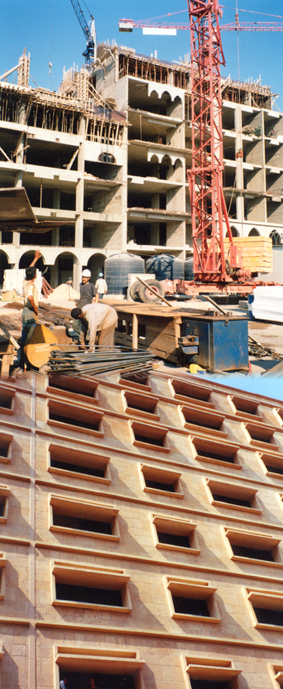
This new downtown Beirut is an incongruous place for a festival, for girls bending over racks of cheap wire jewelry and "art descending into the streets," as the Ministry of Cultural Affairs' posters hung from street lamps above the bobbing heads proclaim. Blaring music and antique sales notwithstanding, this part of Beirut is just beginning to attract small clusters of tourists and shoppers who wade through the few high-end stores that are scattered along the block. It will take more than street fairs to prove to the world that the gargantuan project of rebuilding Beirut is heading in the right direction.
Solidere is the privately owned company that has undertaken the reconstruction of downtown Beirut. The goal is an aesthetically pleasing modern district spreading over about 430 acres of land, a third of which is being reclaimed from the sea. Company backers hope that by restoring to the old city some of its past grandeur they will attract investment that can re-establish Beirut's previous role as the financial and cultural apex of the Middle East. "Wait till we finish remodeling the souk (old market) area, which used to be the soul of the city and a meeting place for people," said Solidere PR point man, Nabil Rached.
He gives his pitch in a downtown Solidere showroom, a portrait of very modern and very expensive glass table tops, models and mirrors, pointing to a bit-sized model of the new Beirut According to Solidere. "It will be crowded every day." Rached is enthusiastically giving a grand tour of his company's new territories." Fifty percent of the surface of the town's center will be reserved as public and green spaces," he says, pointing down at a patch of green on one of the several model downtowns sprinkled around the room. "Downtown Beirut is going to be as beautiful and lively as it used to be," he said, speaking of the new underground parking lot Solidere is building to accommodate the numerous visitors that are expected to crowd the area once a giant commercial center opens. Grandeur and public relations aside, many Beirutis remain skeptical. "What you have now is extremely nice to look at but very impractical to live in," said 50-year-old businessman Ramzi Zakka. According to Zakka, the Solidere project is not practical for most Lebanese, who are experiencing troubled economic times.
Highly controversial, due to obligatory and-for-shares deals Solidere made with former downtown landowners and complaints that they were steamrollering over ancient roman ruins, the reconstruction has given hope to the Beirutis but has failed thus far to bring a much hoped-for economic prosperity.
...continue...